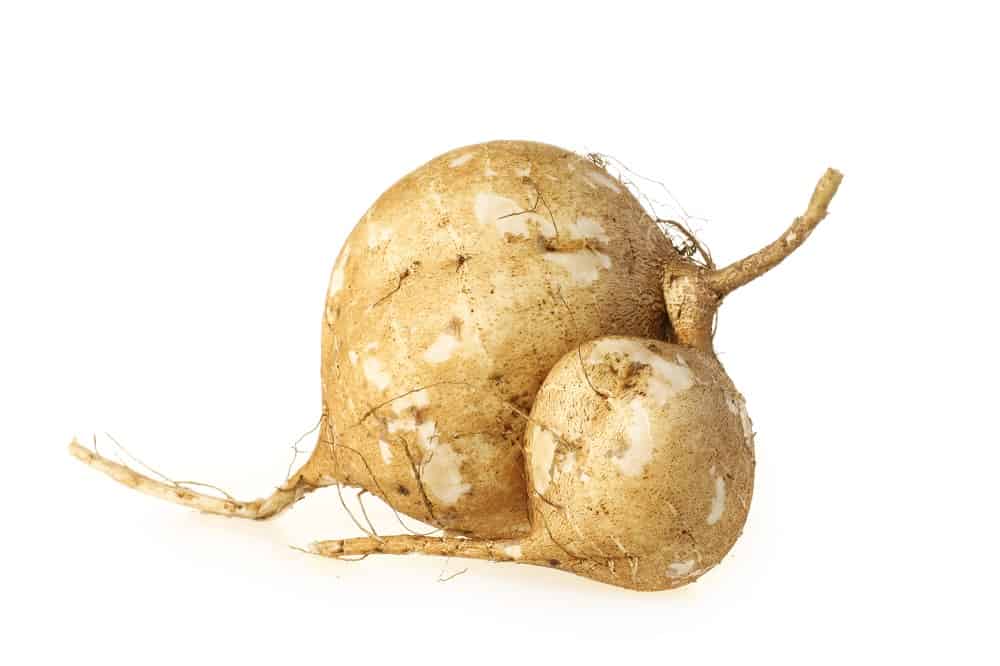Did your pup just grab a bit of jicama from your plate and leave you wondering – “wait a second, can dogs eat jicama?” Rest assured, it is safe for dogs to eat fresh jicama. However, the other parts of the jicama plant can present problems.
This post was reviewed for veterinary accuracy by Cara Wright, DVM. For more information about our review process and Cara, please visit the About Us page.
What is jicama?
Jicama (also known as yam bean) is a delicious root vegetable, frequently used in Mexican and Latin cuisines. It’s got a tough inedible brown skin – but once peeled, you’ll reveal a delicious white interior flesh that’s got a juicy, crunchy texture and a mild taste. Many people compare jicama to a cross between a potato and a pear, or a water chestnut and an apple.
It’s most commonly eaten fresh, though in some dishes it may be grilled or fried.
Can dogs eat jicama?
Yes. As long as you are only serving the edible white flesh and not the other parts of the plant – jicama is safe for dogs.
Keep in mind if you are cooking jicama, you’ll want to avoid serving it to your dog if you’ve added unsafe seasonings like garlic or onion (both of which are toxic for dogs).
Benefits of jicama for dogs
The primary benefit of jicama for a dog is getting extra fiber into their day.
Jicama is an excellent source of fiber, with one cup containing about 6.5 grams (source). According to Cummings Veterinary Medicine Center at Tufts University, fiber can help support digestive health.
If your dog struggles with occasional constipation, jicama may be one option to mix into their diet to help. It has both a high fiber content and contains fluid (both of which support digestive health).
However, if constipation is an ongoing issue, it’s better to talk to your veterinarian to see what other options are out there. A concentrated fiber supplement is likely a more effective option in these cases, but your vet will be able to give you the best advice for your dog.
On the flip side, if your dog is suffering from diarrhea, it’s best to avoid giving them a lot of jicama as it could exacerbate that.
In addition to the potential benefits for constipation, jicama may benefit your dog’s digestive tract through it’s impact on the gut microbiome.
Jicama is high in a certain type of fiber called prebiotic fiber called inulin, which feeds the good bacteria in your dog’s intestinal system (and human’s systems too!). While research in this area is still very new, inulin may affect the composition of a dog’s microbiome, and/or increase the beneficial compounds created in the intestines by these bacteria (source).
Aside from fiber, jicama also has small amounts of vitamins and minerals. It’s most rich in Vitamin C, however, dogs (unlike humans) are actually capable of meeting their Vitamin C requirements through their own body’s production.

Beware of the rest of the jicama plant
Even though the white flesh from the root is safe for dogs to eat, the remainder of the jicama plant, like the seeds and leaves, is toxic (for dogs and humans).
Clearly, this is only a concern if you’re growing fresh jicama and your dog may have access to the plant. While this may not apply to many of us, there are certainly some people in warm climates that may grow their own jicama, so it’s worth discussing.
The seeds of a jicama plant contain a compound called rotenone. Rotenone is also used as a concentrated insecticide outside of its natural plant form. According to the textbook Small Animal Toxicology, this can affect a dog’s nervous system.
A recent case study found a man who ate too many seeds from the jicama plant died (source). This effect could possibly extend to dogs as well if the plant were eaten in excessive amounts.
That said, a quick nibble of a jicama plant should not be a fatal incident in most cases.
According to the Cooperative Extension Offices of Cornell University, dogs fed low to moderate amounts of rotenone for more than a month straight experienced side effects like:
- Excessive salivation
- Vomiting
- Reduced food consumption
- Weight loss
- Bleeding in the intestines
If your dog did get into a jicama plant, don’t panic – as you can see, the biggest risk appears to be with ongoing prolonged exposure, or a massive dose all at once. But you should still call your veterinarian immediately to see what the best course of action is.
As a related aside – rotenone is occasionally used in some topical dog products. For example, Goodwinol Ointment contains a small amount of rotenone used to treat canine mange. This is typically safe when used topically, compared to the ingestion of large amounts of rotenone through insecticides or jicama plants. However, it’s smart to watch out for side effects in this case too, like changes in breathing, muscle twitching, vomiting, or diarrhea – in which case you should call your veterinarian.
A Final Word from Your Dog Eats
As you can see, as long as your dog just grabbed a few bites of the fresh jicama root, there’s no need to worry. If your dog ate the other parts of a jicama plant, though, or if you have any other concerns about their jicama consumption, be sure to call your veterinarian for advice.



very clear and good article easy to understand. Thank you